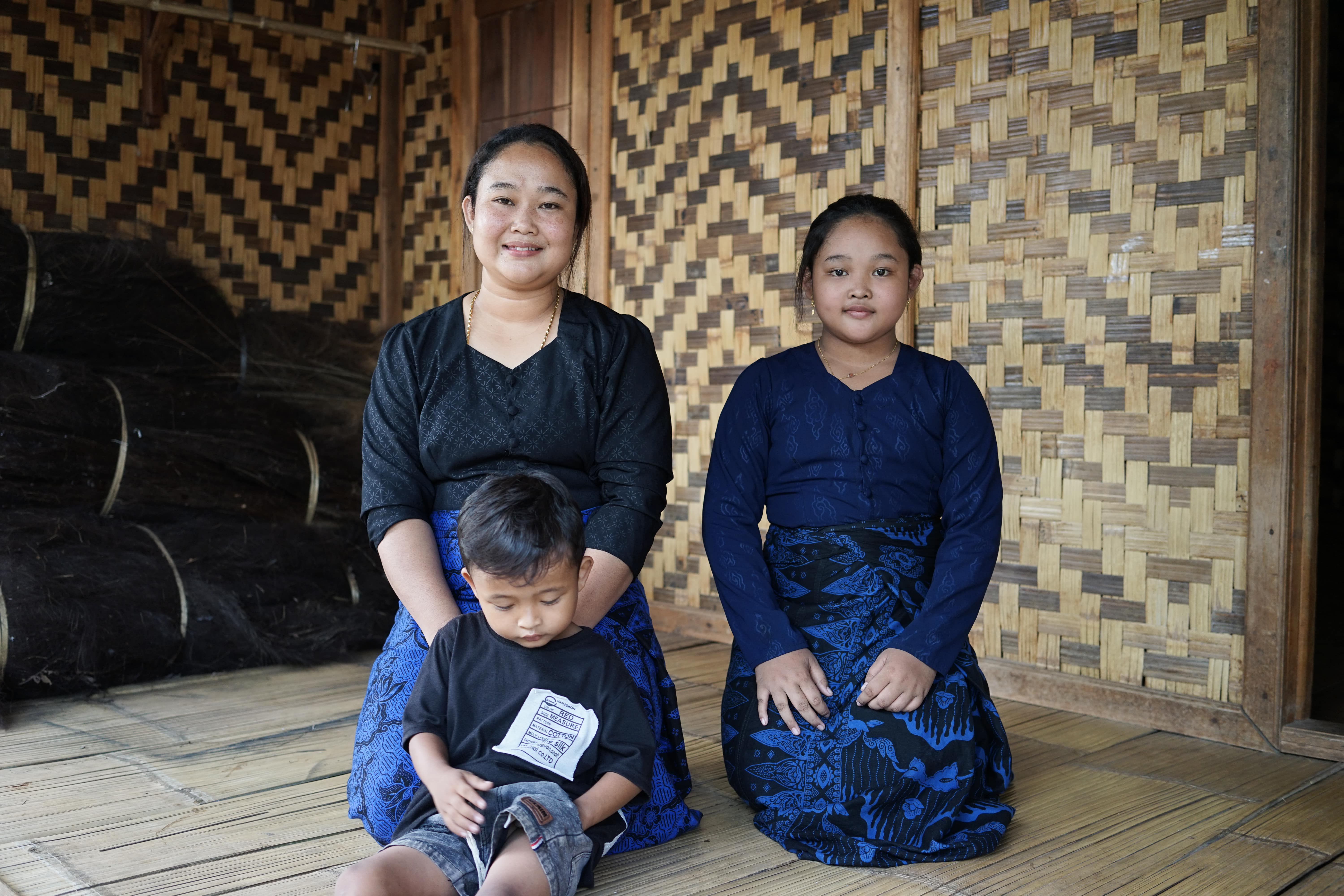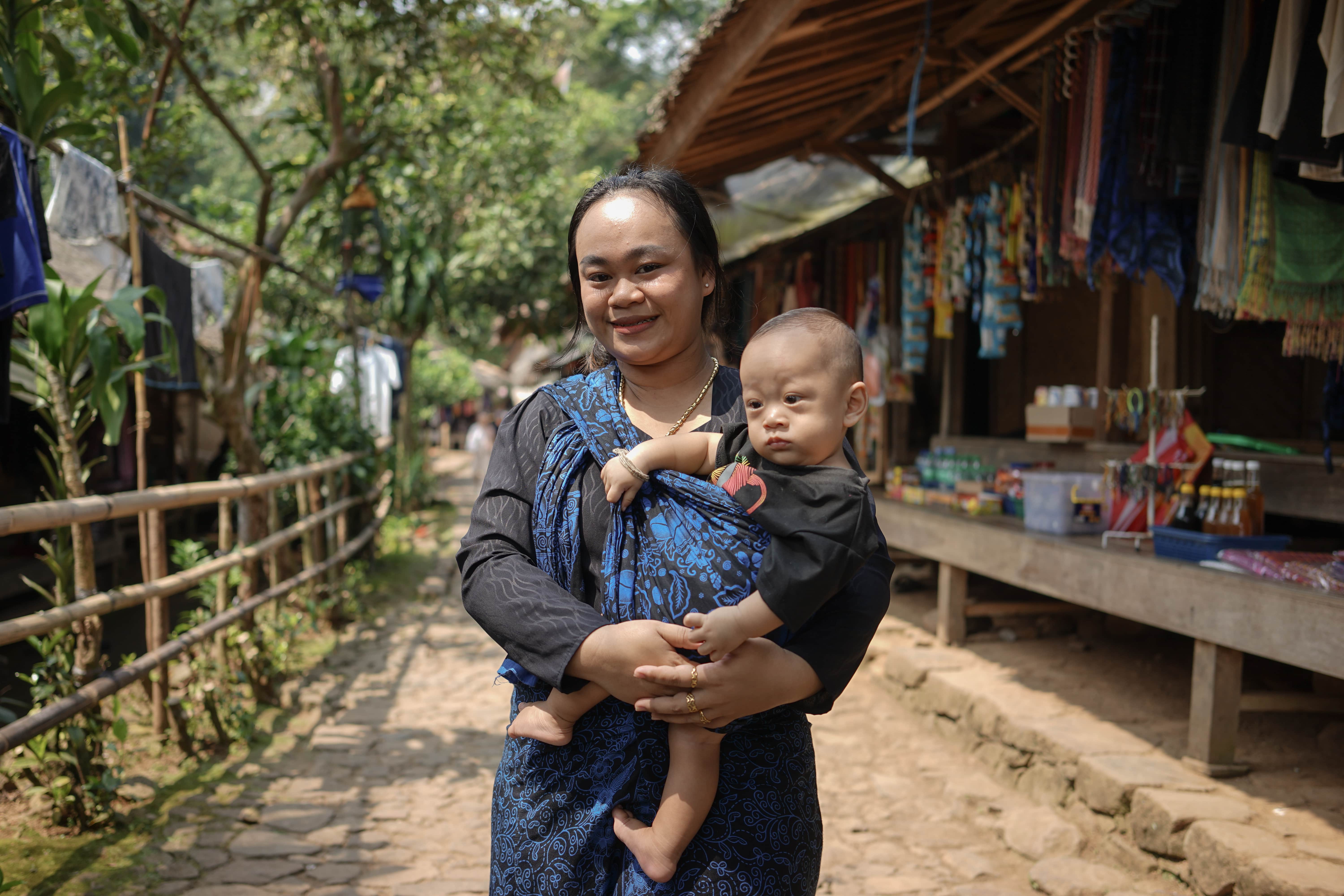Ambu Itoh still remembers when her five-year-old son, Santa, caught measles. “It was really bad,” she says, shaking her head. “He was red all over.” Though Santa recovered quickly, the experience left a deep impression. It strengthened Itoh’s commitment to ensure that not just her son, but every child in Kanekes – a semi-remote Baduy village in Banten Province – can access protection from vaccine-preventable diseases.
On 30 April 2025, it was this commitment that led Itoh – along with several other Baduy mothers – to gather at a traditional bamboo house for an immunization awareness session as part of Indonesia’s World Immunization Week activities. Organized by the Indonesian Pediatric Society (IDAI), with support from the Ministry of Health, World Health Organization (WHO) and UNICEF, the event aimed to build trust in vaccines and improve access in underserved areas.

Ambu Itoh (30) was among the Baduy mothers who attended an immunization awareness session held during World Immunization Week. Her experience with Santa’s measles infection strengthened her resolve to ensure children in her community are fully immunized. (WHO/Fieni Aprilia)
After a mini talk show at the event, Dr Piprim Basarah Yanuarso, Chairperson of IDAI, spoke about the vital role of parents in protecting their children’s health.
“Immunization is every child’s right, especially during the first thousand days of life,” he said. “With over 5400 pediatricians across the country, IDAI is fully committed to supporting the national effort. But we need everyone – from health workers to parents – to work together so that no child misses out.”
Distance, work and worry: Navigating tradition and access
Kanekes is home to around 12 000 Baduy people. The Inner Baduy follow strict customary laws and maintain a traditional way of life. The Outer Baduy live in more accessible areas and have gradually adopted aspects of modern living, including immunization.
While Banten Province has surpassed the national immunization target of 95%, coverage in Lebak District – where Kanekes is located – remains uneven. Only 80% of children have received their first dose of the DPT-HB-Hib vaccine.
.jpg?sfvrsn=1f9b1057_1)
One of the main pathways in Kanekes Village, Banten Province, where the Outer Baduy people sell food, produce, and handmade goods. (WHO/Fieni Aprilia)
One reason for this gap is limited local infrastructure. Itoh’s hamlet is one of 68 in Kanekes served by Puskesmas Cisimeut. Fifteen midwives support maternal and child health across six villages, with nine focused on Kanekes. While the system covers a wide area, the absence of formal posyandu (community health post) workers presents challenges, with many roles now taken on by community volunteers.
For some families, life in the ladang (fields) takes precedence. Families can spend months – or even years – away from their hamlets tending crops. Health visits, though important, are often deprioritized.
Fear of adverse events following immunization adds another layer of hesitation. If a child falls ill after a vaccine, parents worry they’ll be unable to join them in the fields, disrupting livelihoods that depend on every pair of hands.
Yet some parents persist, even in the face of these fears. Ambu Alis, 25, is one of them. Like Itoh, she has made sure all her children receive their vaccines.

Despite her child experiencing a fever after immunization, Ambu Alis remains committed to completing his vaccine schedule. For her, immunization is part of caring for the wider Baduy community, where everyone is seen as family. (WHO/Fieni Aprilia)
“I’ve learned everything from life,” she says with quiet pride. While her youngest, Alga, developed a mild fever after one of his vaccines – a common side effect – it didn’t shake her resolve. “Alga will get his shots again, and if necessary, I’ll be ready to stay up all night.”
For Alis, immunization reflects one of the Baduy community’s core values: collective responsibility. “It depends on whether the person wants to do it or not,” she says. “But for us, everyone is family – not just in one hamlet, but across all villages.”
From home to hamlet to health for all
That same sense of shared responsibility is central to Indonesia’s broader immunization efforts. Under the Ministry of Health’s National Immunization Programme, and Immunization Strategy 2025–2029, the country is working to improve vaccine coverage, reduce missed doses and expand outreach to underserved populations.
WHO, together with UNICEF and other partners, continues to support these efforts through technical assistance, capacity building and tailored guidance for local contexts.
“Strengthening immunization isn’t just about delivering vaccines – it’s about bringing communities with us,” said Stephen Chacko, Team Lead for Immunization at WHO Indonesia, at the awareness session in Kanekes.
“Events like this are essential for building trust, listening to concerns and helping families feel confident about protecting their children. Community engagement is the foundation for closing coverage gaps and achieving health for all.”
In places like Kanekes, the commitment of local families, supported by responsive services and national coordination, is helping turn immunization into a shared responsibility, and a shared success.
Written by Fieni Aprilia, Digital Communications Officer, WHO Indonesia
